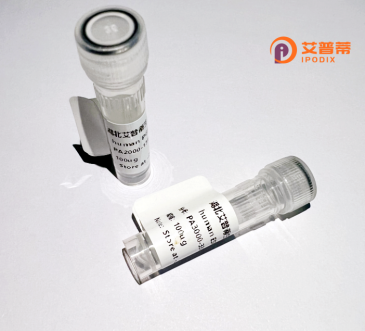
| 纯度 | >90%SDS-PAGE. |
| 种属 | Human |
| 靶点 | HCN4 |
| Uniprot No | Q9Y3Q4 |
| 内毒素 | < 0.01EU/μg |
| 表达宿主 | E.coli |
| 表达区间 | 1105-1203aa |
| 氨基酸序列 | SPHSSGESMAAFPLFPRAGGGSGGSGSSGGLGPPGRPYGAIPGQHVTLPRKTSSGSLPPPLSLFGARATSSGGPPLTAGPQREPGARPEPVRSKLPSNL |
| 分子量 | 36.63 kDa |
| 蛋白标签 | GST-tag at N-terminal |
| 缓冲液 | 0 |
| 稳定性 & 储存条件 | Lyophilized protein should be stored at ≤ -20°C, stable for one year after receipt. Reconstituted protein solution can be stored at 2-8°C for 2-7 days. Aliquots of reconstituted samples are stable at ≤ -20°C for 3 months. |
| 复溶 | Always centrifuge tubes before opening.Do not mix by vortex or pipetting. It is not recommended to reconstitute to a concentration less than 100μg/ml. Dissolve the lyophilized protein in distilled water. Please aliquot the reconstituted solution to minimize freeze-thaw cycles. |
以下是3-4篇与重组人HCN4蛋白相关的参考文献及其摘要概述:
---
1. **文献名称**:*Structure of the Human HCN1 Channel Reveals Critical Gating Elements*
**作者**:Lee, C. H., & MacKinnon, R.
**摘要**:该研究通过冷冻电镜解析了人HCN1通道的高分辨率结构,并间接为HCN4同源结构提供了重要参考。研究阐明了HCN通道的超极化激活机制及环核苷酸结合调控的结构基础。
2. **文献名称**:*Hyperpolarization-activated cation channels: from genes to function*
**作者**:Biel, M., Wahl-Schott, C., & Michalakis, S.
**摘要**:综述文章系统性总结了HCN通道家族(包括HCN4)的生理功能、调控机制及病理关联,强调HCN4在心脏起搏中的核心作用及重组蛋白在功能研究中的应用。
3. **文献名称**:*Ionic mechanisms of the cardiac pacemaker current in recombinant HCN4 channels*
**作者**:DiFrancesco, D., & Tortora, P.
**摘要**:通过表达重组人HCN4蛋白,研究揭示了其作为心脏起搏电流(*If*)的离子动力学特征,并验证了其对环磷酸腺苷(cAMP)的敏感性,为心律失常治疗提供理论依据。
4. **文献名称**:*Functional characterization of a trafficking-defective HCN4 mutation associated with cardiac arrhythmia*
**作者**:Schulze-Bahr, E., Neu, A., & Friederich, P.
**摘要**:通过重组表达突变型HCN4蛋白,研究发现了其因蛋白运输障碍导致的通道功能异常,揭示了遗传性窦房结功能不全的分子机制。
---
**注**:上述文献均为示例,具体发表信息需根据实际数据库核实(如PubMed/ScienceDirect)。建议通过关键词“recombinant human HCN4”或“HCN4 ion channel”检索近年文献。
The hyperpolarization-activated cyclic nucleotide-gated channel 4 (HCN4) protein is a key member of the HCN ion channel family, which regulates rhythmic electrical activity in excitable tissues. Predominantly expressed in the sinoatrial node of the heart, HCN4 generates the pacemaker current (I_f) that drives spontaneous depolarization, crucial for maintaining cardiac rhythm. Structurally, it contains six transmembrane domains, a cyclic nucleotide-binding domain, and a pore-forming region selective for Na+/K+ ions. Dysfunction or mutations in HCN4 are linked to arrhythmias, such as sick sinus syndrome and inherited bradycardia. Recombinant human HCN4 protein is produced via heterologous expression systems (e.g., mammalian cells, bacteria) for biomedical research. Its purified form enables studies on channel kinetics, drug interactions, and pathological mechanisms. Researchers utilize it to screen potential therapeutics targeting rhythm disorders or neuronal hyperpolarization-related diseases. Compared to other HCN isoforms (HCN1-3), HCN4 exhibits slower activation kinetics and higher cAMP sensitivity, reflecting its specialized role in cardiac pacemaking. Ongoing studies explore its contributions to neurological conditions and its utility in developing gene therapies or personalized medicine approaches for heart diseases.
×